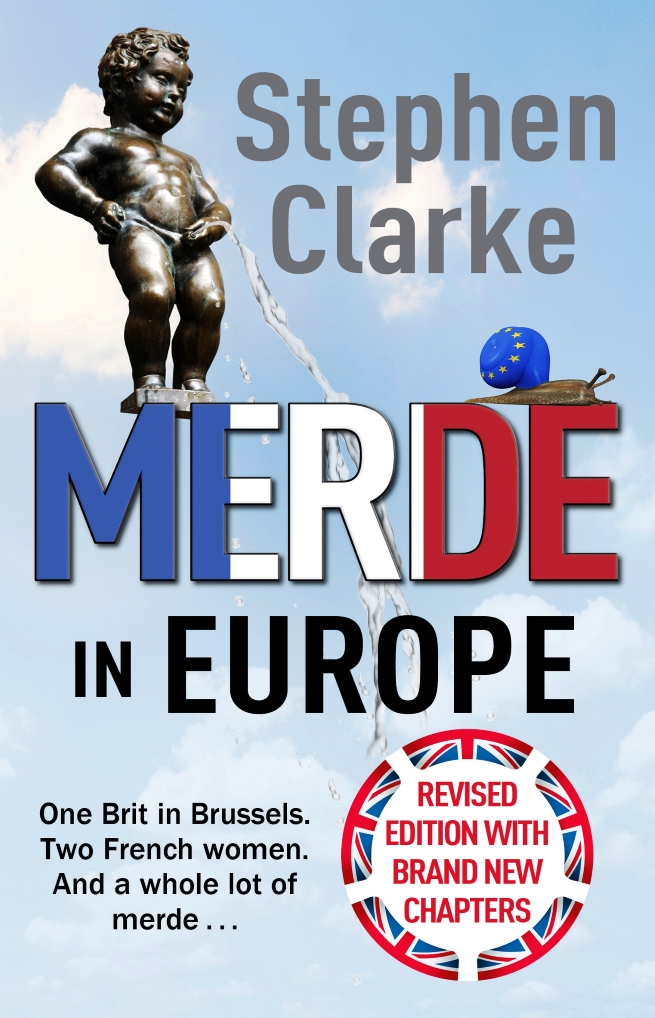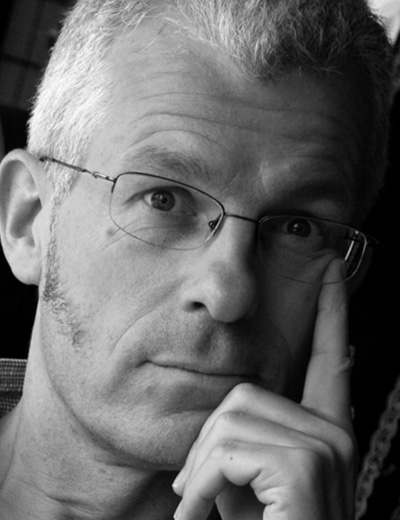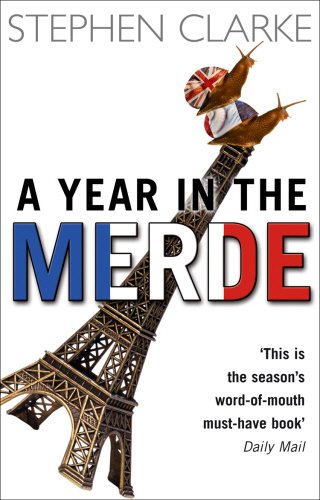In the Merde with Stephen Clarke: An Interview with the Author
- SUBSCRIBE
- ALREADY SUBSCRIBED?
BECOME A BONJOUR PARIS MEMBER
Gain full access to our collection of over 5,000 articles and bring the City of Light into your life. Just 60 USD per year.
Find out why you should become a member here.
Sign in
Fill in your credentials below.
Bestselling British “Merde” books Author dishes on his new book, French formalities, and his favorite place in France
I first became aware of Stephen Clarke seven years ago.
I saw my roommate in Chicago reading A Year in the Merde at the kitchen table, as he ate a bowl of Lucky Charms. I knew that for this particular roommate to be reading – whilst also enjoying a sugary breakfast – the book had to be good.
Stephen Clarke self-published A Year in the Merde in 2004, and it was an instant international bestseller. (In France, the title is God Save la France.) The book chronicles the trials and tribulations of Paul West, a Brit living in Paris. The title comes from stepping in something often seen on Paris’s cobblestoned streets; no, not cigarette butts.
At the time my roommate was reading Merde, I was preparing to move to Paris for a job. Before the move, I made feeble attempts to ready myself for French culture by doing things which, now – from the great height of seven years – seem amusing, clueless, and yet also totally and completely endearing, in a how-could-you-not-enjoy-spending-time-with-such-a-hopelessly-naive-Pollyanna-type way.
I watched La Vie en Rose, I read Le Petit Prince, and I listened to France Info every morning. I figured I was well-armored to survive Paris, now that I’d brushed up on biographical information about Edith Piaf, the plot of Antoine de Saint-Exupéry’s prince, and how to say: “It’s raining very hard in the north today.”
I now know that I’d have been better served by talking to an actual French person, or simply someone who had lived in France. The closest I came to doing either of those things was buying and reading a copy of A Year in the Merde to round out my “study of all things French.”
It turned out to be the best bit of preparation I did.
I loved the book. So, I sent Clarke an email telling him so, and requested to meet for coffee after I was settled in Paris. Six years ago this spring, Clarke and I met for coffee in the Marais at Café Charlot. He graciously gave up time in his afternoon to talk to an aspiring writer/journalist about what life is like in Paris, and what it takes to be a professional writer.
I’ll admit, I don’t quite recall all of what we discussed, but I remember leaving our coffee meeting feeling more excited to be in France than I was before I entered the coffee shop, and my face hurt from laughing (along with a slight lingering headache from staying out a bit too late in the Latin Quarter the previous night).
Much like Paul West, the character in Clarke’s novels, Clarke is amusing and observational. The English are known for their sense of humor (along with politesse, fixation on weather, and the sun previously never setting on their empire), and Clarke’s sense of humor is, in this writer’s view, the reason his books are so successful.
Reading a Stephen Clarke book is like hanging out with your really funny friend, the one who can captivate a whole table at the pub with a wild tale or engaging story, sprinkling it with bits of humor throughout, and making it so engrossing that you feel like you lived it too. Then, when it’s your turn to tell a story at the pub on a different night, you just tell that one, and hope you tell it as well. (“So, my friend told me this thing at the pub last week, and you’ll never believe what happened to him while he was on holiday…”)
Six years after our first meeting in 2011, I spoke to him again: me in New York, and him in Paris. We spoke about – among other things – his new novel, Merde in Europe, why French writers are different, and the little-known website from which he gets all the ideas for his books.
(Spoiler alert: such a website does not exist.)
How would you describe your most recent book?
A jewel in the crown of literature by one of the world’s most modest geniuses (or should that be genii? I’m useless at Latin). No, my novel Merde in Europe is a comedy set in Brussels just before the Brexit referendum. The hero, a Brit called Paul West, goes there to work for a French politician who says she wants to help keep Britain in the EU. He’s not sure that is her true motive, but he goes there anyway, and finds out what really happens in the corridors of European power.
To research the novel, I went to Brussels and shadowed friends and acquaintances who work in various departments of the megalithic EU bureaucracy. I promised to change their names, nationalities and (often) genders in the novel in return for them dishing all their secrets. It was fascinating, tragi-comic, shocking but also uplifting. Most people working for the EU want nothing less than the best working and living conditions, the cleanest air and water, and the purest food, for all its citizens. And to be paid a fortune for providing it, of course.
Anyway, Paul has a lot of fun while sneaking about in Brussels, as I did. So to answer your question, I’d say Merde in Europe is a comic exposé. Or maybe EUxposé?
How do you get your ideas for your novels?
From a website, ideasfornovels.com (or in this case .eu).
What is your favorite book you’ve written, and why?
It would have to be my first novel, A Year in the Merde. Not only did it get me started as a professional writer, its success was such a huge shock that I still feel grateful to everyone who started to buy it after I self-published it. They believed in a novel that no publisher wanted. It was a fantastic feeling. I am also very fond of 1000 Years of Annoying the French. It was a huge amount of research, and quite a risk – retelling a millennium’s worth of history, with jokes – but it went to number one in the UK, and started me off on my new, second career writing history books.
Why do you think your books have been so popular internationally, as well as in France?
I always try to find the funny side of life. People tell me they feel happier after reading one of my books. That must be a partial explanation. The other explanation is that I have hacked into the Amazon sales database and rewritten my sales figures.
Seriously, though, when I write about France I always try to tell the truth. And it’s all observation of everyday life here. I’m not relying on clichés or a couple of weeks living in a posh ex-pat ghetto on the Left Bank. I’ve lived all over Paris for more than 20 years, worked for French companies, speak the language, and think like a Parisian (mantra: Get out of the way, s’il vous plaît). The French recognize this, and I’m guessing other people do too.
If you had to generalize, do you think there are certain characteristics that French writers have (due to their French cultural outlook or educational background) that writers of other nationalities may not have to the same degree?
Yes, they have to write about their mothers. They have to prove they’re more intelligent than their readers. And I’ve noticed that a suspicious number of them write in French. That’s the trouble with generalizations – they’re too general. I can’t really generalize.
What are you currently reading?
Your questions. Other than that, a book by the British musician called George Melly, Revolt into Style, about the pop revolution in the 1960s. Pop music, art, literature, design. He wrote it in 1970 and it’s full of great insights into creating unpretentious, intelligent but accessible art. I’m also doing research for a history book, but that will have to remain secret. Let’s just say it’s the memoirs of an 18th century Frenchman. I can’t get any vaguer than that.
What is your favorite place in France?
My bed. After that, the café on the corner of my street. When I go there early in the morning, I don’t have to say a word. Except “bonjour,” of course. I lean against the bar and they give me an espresso and the newspaper while I wake up. After that, I’d have to say the beaches on the île d’Oléron, on the west coast of France. Great for surfing.
Are you working on another book right now, and if so, can you share any details about it?
Yes and no. Except that it’s history. I alternate – novel, history, novel, history (are you sensing a pattern?).
What were some of your favorite books when you were a child?
A la Recherche du Temps Perdu, War and Peace. Though that was before I learnt to read. I used them as bridges for my toy cars. Later, I really loved the William books by Richmal Crompton. A gang of boys having adventures in woods, fields and other people’s back gardens, their most technological toy a stick that looked like a sword. Funny that they were written by a woman – they were so boyish.
What advice would you give someone who is going to visit France?
Don’t forget your passport. And always begin every conversation with “bonjour,” or in the evening “bonsoir“. Even if you can’t say anything else in French, those two magically polite words will ensure that your visit is a friendly, successful one. The French are an old-school people. Even while Parisians are pushing you out of the way, they’ll say “pardon, Monsieur.”
Stephen Clarke’s Merde in Europe is avilable on Amazon.
Lead photo credit : Merde in Europe







REPLY
REPLY